Antibiotics are powerful medications used to treat bacterial infections, but not all antibiotics are safe or effective for dogs. Giving your dog the wrong antibiotic can be dangerous and even worsen their condition. Understanding which antibiotics a dog can take requires veterinary guidance. This article will explore the importance of consulting a vet, common canine bacterial infections, and the potential risks of misusing antibiotics.
Understanding the Importance of Veterinary Consultation
 A dog taking antibiotics.
A dog taking antibiotics.
Before administering any medication, including antibiotics, to your dog, a consultation with a licensed veterinarian is crucial. They will perform a thorough examination to diagnose the specific infection and determine the appropriate course of treatment. Never give your dog human antibiotics as they can cause serious harm.
Common Bacterial Infections in Dogs
Dogs can suffer from various bacterial infections, including:
- Skin infections: Often caused by Staphylococcus bacteria.
- Ear infections: Frequently caused by bacteria like Pseudomonas or E. coli.
- Urinary tract infections (UTIs): Often caused by E. coli or other bacteria.
- Respiratory infections: Can be caused by various bacteria, such as Bordetella bronchiseptica.
- Dental infections: Bacteria can accumulate in plaque and cause infections.
Each type of infection requires specific antibiotic treatment. A vet can identify the bacteria causing the infection and prescribe the most effective antibiotic.
Commonly Prescribed Antibiotics for Dogs
While only a vet can determine the appropriate antibiotic for your dog, some commonly prescribed antibiotics include:
- Amoxicillin/Clavulanate: Effective against a wide range of bacteria. can dogs get ingrown nails
- Cephalexin: Often used for skin and soft tissue infections.
- Enrofloxacin (Baytril): A broad-spectrum antibiotic. clavacillin for dogs 62.5 mg
- Doxycycline: Used for Lyme disease, leptospirosis, and other infections.
- Sulfamethoxazole/Trimethoprim: Effective against UTIs and other infections.
Risks of Misusing Antibiotics in Dogs
Giving your dog the wrong antibiotic, an incorrect dosage, or administering it for the wrong duration can have serious consequences, such as:
- Antibiotic resistance: Overuse or misuse of antibiotics can lead to bacteria developing resistance, making future infections harder to treat.
- Adverse reactions: Dogs can experience allergic reactions or side effects, such as vomiting, diarrhea, or loss of appetite. sulfadimethoxine for dogs without vet prescription
- Worsening of the infection: The wrong antibiotic might not target the specific bacteria causing the infection, allowing it to spread and worsen.
Can I give my dog expired antibiotics?
No, never give your dog expired antibiotics. They may be less effective and could even be harmful.
What if my dog accidentally takes human antibiotics?
If your dog accidentally ingests human antibiotics, contact your veterinarian or a pet poison control center immediately. how to tell if dogs teeth hurt
“Always prioritize your dog’s health by consulting a vet before giving them any medication,” advises Dr. Emily Carter, DVM, a leading veterinarian in New York City. “Misusing antibiotics can have serious long-term consequences for your pet’s health.”
Conclusion
Understanding what antibiotics a dog can take is crucial for responsible pet ownership. Never self-treat your dog with antibiotics. what is orbax used for in dogs Always consult with a veterinarian for proper diagnosis and treatment. Their expertise will ensure your furry friend receives the correct medication and dosage, minimizing potential risks and promoting a swift recovery.
FAQ
- How can I tell if my dog has a bacterial infection? Only a veterinarian can definitively diagnose a bacterial infection. Symptoms can vary but may include lethargy, loss of appetite, fever, vomiting, diarrhea, skin changes, or changes in urination or defecation.
- Are there natural alternatives to antibiotics for dogs? While some natural remedies may help support a dog’s immune system, they should not be used as a replacement for antibiotics when a bacterial infection is present.
- How long does it typically take for antibiotics to work in dogs? Improvement is often seen within a few days, but it’s essential to complete the entire course of antibiotics as prescribed by your veterinarian, even if your dog seems better.
- Can I give my dog probiotics while they are on antibiotics? Yes, probiotics can help support gut health during antibiotic treatment. Talk to your vet about the best probiotic options for your dog.
- What should I do if my dog experiences side effects from antibiotics? Contact your veterinarian immediately if your dog experiences any adverse reactions to antibiotics.
- Can antibiotics be given to pregnant or nursing dogs? Certain antibiotics are safe for pregnant or nursing dogs, but it’s crucial to consult with your veterinarian before administering any medication.
- How are antibiotics administered to dogs? Antibiotics for dogs can come in various forms, including pills, capsules, liquids, and injectables. Your veterinarian will determine the best method of administration based on your dog’s specific needs.
Beautdogs.us is your premier source for all things dog-related in the US. We offer expert advice on dog breeds, care, and products. Whether you’re a new dog owner or a seasoned expert, Beautdogs.us provides comprehensive and trustworthy information to help you navigate the world of canine companionship. Contact us today for all your dog-related needs! Email: [email protected], Phone: +1 501-555-7529. Visit Beautdogs.us for more valuable insights and expert guidance.